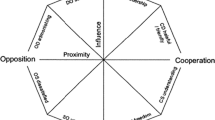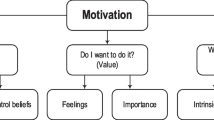Abstract
Nowadays many schools in higher education implement problem-based learning to foster active learning processes by students. In some schools with a number of years of experience with this approach, phenomena can be observed which indicate signs of wear. The implementation of a large-scale innovation such as problem-based learning (PBL) seems to provoke different activities and attitudes in those actors who are most involved. Students and staff members seem to behave in a way which could be counterproductive to the development of self-directed learning. In the first part of this paper, we briefly describe the cognitive psychological background of PBL. In the second part various adjustments observed in problem-based curricula and their effects on students’ learning are analyzed. Arguments are presented about adverse effects on the implementation of this educational innovation. Special attention is given to teachers’ concerns. In the third part suggestions are made about ways to revitalize PBL processes as well as suggestions about effecting educational innovations on a more solid basis
Similar content being viewed by others
References
J.A.R. Arts W.H. Gijselaers S.R. Segers (2002) ArticleTitle‘Cognitive effects of an authentic computer-supported, problem-based learning environment’ Instructional Science 30 465–495 Occurrence Handle10.1023/A:1020532128625
Barrows, H.S. (2001). www.pbli.org.
H.S. Barrows R.M. Tamblyn (1980) Problem-based Learning, An Approach to Medical Education Springer New York
J.D. Bransford A.L. Brown R.R. Cocking (1999) How People Learn: Brain, Mind, Experience, and School National Academy Press Washington
M.A. Dahlgren L.O. Dahlgren (2002) ArticleTitle‘Portraits of PBL: Students’ experiences of the characteristics of problem-based learning in physiotherapy, computer engineering and psychology’ Instructional Science 30 111–127 Occurrence Handle10.1023/A:1014819418051
W.S. Grave ParticleDe H.P.A. Boshuizen H.G. Schmidt (1996) ArticleTitle‘Problem-based learning: Cognitive and metacognitive processes during problem analysis’ Instructional Science 24 321–341 Occurrence Handle10.1007/BF00118111
D. Dolmans M. Hurkvan Particleden I. Wolfhagen C. Vleutenvan Particleder (1996) ArticleTitle‘Limiting tutorial-group size’ Academic Medicine 71 4a
Driessen E.W., Vleuten van der C.P.M. (2002). ‘Universiteit Maastricht: Portfolio’s voor eerstejaars studenten geneeskunde’ (Maastricht University: Portfolios for first year medical students). In: Driessen E., Beijaard D., Tartwijk J. van and Vleuten C., van der (eds). Portfolio’s. Groningen: Wolters-Noordhoff, pp. 37–47
N. Frederiksen (1984) ArticleTitle‘The real test bias: Influences of testing on teaching and learning’ American Psychologist 39 193–202 Occurrence Handle10.1037//0003-066X.39.3.193
B. Hoffman D. Ritchie (1997) ArticleTitle‘Using multimedia to overcome the problems with problem-based learning’ Instructional Science 25 97–115 Occurrence Handle10.1023/A:1002967414942
M.E. Gredler (1999) Classroom Assessment and Learning Longman New York
K.A. Leithwood D. Tomlinson M. Genge (1996) ‘Transformational school leadership’ K. Leithwood J. Chapman D. Corson Ph. Hallinger A Hart (Eds) International Handbook of Educational Leadership and Administration. Kluwer Academic Publishers Dordrecht 785–840
M. Lejk M. Wyvill S. Farrow (1996) ArticleTitle‘A survey of methods of deriving individual grades from group assessments’ Assessment Evaluation in Higher Education 21 267–280
B.M. Miflin C.B. Campbell D.A. Price (2000) ArticleTitle‘A conceptual framework to guide the development of self-directed, lifelong learning in problem-based medical curricula’ Medical Education 34 299–306 Occurrence Handle10.1046/j.1365-2923.2000.00564.x Occurrence Handle10733727
J. Moust H. Roebertsen H. Dahlmans A. Rijk Particlede H. Savelberg (2003) ArticleTitle‘Probleemgestuurd onderwijs met studieteams’ (Problem-based learning with studyteams) Onderzoek van Onderwijs 32 8–12
J.H.C. Moust (1993) De rol van tutoren in probleemgestuurd onderwijs Contrasten tussen student- en docent-tutoren (The Role of the Tutor in Problem-based Learning Contrasts Between Student and Staff Tutors) Maastricht University Datawyse
J.H.C. Moust P.A.J. Bouhuijs H.G. Schmidt (2001) Problem-based Learning: A Student Guide Wolters-Noordhoff Groningen
A.C. Myers Kelson (2000) ‘Epilogue: Assessment of students for proactive lifelong learning’ D.H. Evensen C.E Hmelo (Eds) Problem-based Learning. A Research Perspective on Learning Interactions Lawrence Erlbaum Mahwah 315–345
G.T. Norman H.G. Schmidt (1992) ArticleTitle‘The psychological basis of problem-based learning: A review of the evidence’ Academic Medicine 67 557–565 Occurrence Handle1520409
H.G. Schmidt (1983) ArticleTitle‘Problem-based learning: Rationale and description’ Medical Education 17 11–16 Occurrence Handle6823214
Schmidt, H.G. (1999). ‘Testing a causal model of problem-based learning’, Presented at the Annual Meeting of the American Educational Research Association, Montreal, CA, April 19–23
Schmidt, H.G. and Gijselaers, W.H. (1990). ‘Causal modeling of problem-based learning’, Presented at the Annual Meeting of the American Educational Research Association, Boston, MA, April 16–22.
H.G. Schmidt J.H.C. Moust (2000) ‘Factors affecting small-group tutorial learning: A review of research’ D.H. Evensen C.E Hmelo (Eds) Problem-based Learning A Research Perspective on Learning Interactions. Lawrence Erlbaum Mahwah 1–16
H.G. Schmidt A. Arend ParticleVan der I. Kokx L. Boon (1993) ArticleTitle‘Influence of tutors’ subject-matter expertise on student effort and achievement in problem-based learning’ Academic Medicine 68 748–791 Occurrence Handle8397599
P. Senge N. Cambron-McCabe T. Lucas B. Smith J. Dutton A. Kleiner (2000) Schools that Learn. A Fifth Discipline Fieldbook for Educators, Parents, and Everyone Who Cares About Education Doubleday New York
N.S. Shapiro J.H. Levine (1999) Creating Learning Communities: A Practical Guide to Winning Support, Organizing for Changen, and Implementing Programs Jossey Bass San Fransico (Cal)
H.J.M. Berkel ParticleVan H.G. Schmidt (2000) ArticleTitle‘Motivation to commit oneself as a determinant of achievement in problem-based learning’ Higher Education 40 231–242 Occurrence Handle10.1023/A:1004022116365
Van Berkel, H.J.M. and Til, van C.T. (1998). ‘Group performing in a problem-based curriculum: The development and evaluation of an instrument’, Presented at the AERA Conference in San Diego CA, April 1998 (ERIC Document Reproduction Service No. TM031271).
Berg ParticleVan den (1993) ArticleTitle‘The concerns-based adoption model in the Netherlands, Flanders and the United Kingdom: State of the art and perspective’ Studies in Educational Evaluation 19 201–223
R. Berg ParticleVan den A. Ros (1999) ArticleTitle‘The permanent importance of the subjective reality of teachers during educational innovation: A concerns-based approach’ American Educational Research Journal 36 879–906
Van den Berg R., Vandenberghe R. (eds). (1995). ‘Wegen van Betrokkenheid: Reflecties op onderwijsvernieuwing’ [Ways of being Concerned: Reflections on Educational Innovation]. Tilburg, the Netherlands: Zwijsen.
Van der Hurk, M. and Van Berkel, H.J.M. (2002). ‘Effects of student employment on study-behavior and achievement in a problem-based curriculum’, Presented at the Meeting of the American Educational Research Association, April 1–5, New Orleans, LA, U.S.A.
J.D. Vermunt L. Verschaffel (2000) ‘Process-oriented teaching’ R.J. Simons J. Linden Particlevan der T Duffy (Eds) New Learning. Kluwer Academic Publishers Boston 209–227
Author information
Authors and Affiliations
Corresponding author
Rights and permissions
About this article
Cite this article
Moust, J.H.C., Berkel, H.J.M.V. & Schmidt, H.G. Signs of Erosion: Reflections on Three Decades of Problem-based Learning at Maastricht University. High Educ 50, 665–683 (2005). https://doi.org/10.1007/s10734-004-6371-z
Issue Date:
DOI: https://doi.org/10.1007/s10734-004-6371-z




